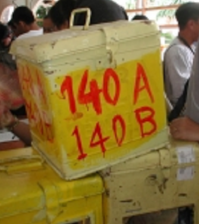ILOILO CITY—Voters of Altavas town in Aklan can write “Bulldog” in their ballots in next year’s midterm elections and won’t end up voting for a pudgy, heavy-set canine with an intimidating, scrunched-up face.
They would instead be voting for a second term for incumbent Mayor Denny Refol, who also held the post from 1998 to 2007.
In Negros Occidental, a vote for “Kurokokok” won’t be for a local bird species but for Leonardo Erobas, who is running for provincial board member.
The voters of Sapi-an town in Capiz can write “Tabagak,” a local term for salted dried fish, if they want to vote for Jonathan Tamayo, a candidate for municipal councilor.
Candidates for next year’s elections have written down what they think are catchy nicknames in their certificates of candidacy—ranging from the common to the hilarious—to boost name recall.
Votes for these names will be counted in favor of candidates who registered the names as their nickname in their COCs filed with the Commission on Elections.
Election rules allow a candidate to register one nickname or “stage name” by which he or she is generally or popularly known in the locality where he or she is running for a position.
Aside from being easy to remember, the nickname is also helpful if several candidates have similar first or last names.
Comelec Western Visayas director Dennis Ausan said nicknames are important because many voters write these instead of the complete name of candidates in the ballot since they are usually shorter and are easier to remember. .
But Ausan said the candidates in next year’s elections were limited to 30 characters in indicating their names and nicknames, including the spaces between names.
Most have adopted nicknames similar to or are the abbreviations of their first or last names.
Other candidates are using popular Hiligaynon terms of endearment like “Inday,” “Toto,” “Nonoy,” “Boy” and “Neneng.”
However, there are nicknames that seem totally detached from the candidate’s first or last names but reflect the owner’s prominent physical appearances like “Morena” (tanned or brown-skinned), “Hapon” (Japanese), “Kalbo” (bald), “Tambok” (fat) and “Gamay” (small).
Reelectionist Mayor Alex Centena of Calinog, Iloilo, who has a mustache is nicknamed “Bigote.”
One candidate, Romeo Cagampang, who is running for councilor in Leon town in Iloilo doesn’t mind being called “Boy Sunog” (burnt).
Some have adopted macho-sounding monikers, such as “Rambo” for Peter Lijoe, who is running for councilor of Banate town in Iloilo and “Cowboy” for Job Medenceles, a mayoral candidate of Isabela town in Negros Occidental.
Henry Golingan, a candidate for councilor of Carles town in Iloilo, is also known as “Kingkoy” (comical) while Jeorge Alvarez, who is running for councilor of Pototan town in Iloilo, has written down “Suave,” which he apparently thinks is a cool-sounding nickname.
Former Bombo Radyo broadcasters Jafet Salinas, David Gano and Greg Gasataya have adopted “Bombo” before their first names as their nicknames.
Some have adopted cryptic nicknames like “4K” adopted by Rogelio Balandra, a candidate for councilor of Cadiz City in Negros Occidental, while Roger Lumbre, a vice mayoral candidate in Makato town in Aklan, is also known as “Boy Magic.”
Mayoral candidate Jose Christopher Varona of Sebaste town in Antique is already popular if based on his nickname. He has adopted “Bantog” (well-known) as his nickname.
But Paul Vincent de la Cruz, a candidate for councilor in Nueva Valencia town in Guimaras, probably believes that a candidate should be endeared to voters in order to win the elections. His nickname is “My Love.”
